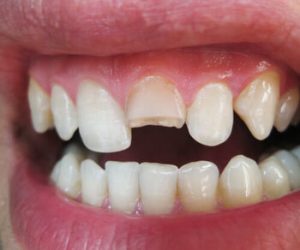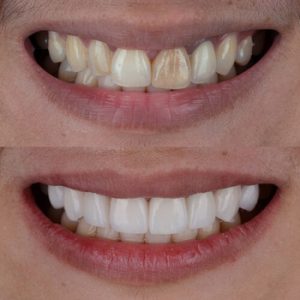Many veneer wearers wonder, “Can you eat with veneers?” Whether you’ve just gotten your new smile or are considering enhancing your teeth with veneers, understanding how they impact your daily life is crucial. Veneers, be they crafted from porcelain or composite resin, are designed to mimic the look of your natural teeth, but they also raise questions about dietary restrictions and care.
In this blog post, we will delve deep into what you can and cannot eat with veneers.
The Initial Phase with Temporary Veneers
Understanding Temporary Veneers
After your initial procedure, you’ll enter a transition phase where you’re fitted with temporary dental veneers. This interim period is crucial as it allows your dentist to make precise adjustments to your final veneers while ensuring your teeth remain protected. During this time, your teeth might feel slightly different, and your bite may not be as you’re used to. It’s important to approach this phase with care, particularly when it comes to your diet.
Dietary Precautions with Temporary Veneers
Temporary veneers are not as robust as the permanent ones you will soon receive. They are designed to serve as a placeholder, allowing you to get accustomed to the feel of veneers and maintain a natural appearance while your permanent veneers are being crafted. Given their temporary nature, these veneers are more susceptible to damage from certain types of foods. To avoid any issues that could compromise the integrity of these temporary coverings, there are specific dietary recommendations you should follow.
Avoiding Hard Foods

Steering Clear of Sticky Foods
Similarly, sticky foods pose a risk to your temporary dental veneers. Foods like caramel, taffy, or even chewy bread can pull at the veneers, potentially causing them to become loose or detach completely. It is advisable to avoid such foods until your permanent veneers are in place.
During this initial phase with temporary veneers, it’s essential to be mindful of what you eat and how you eat. Although it might require some adjustments to your usual diet, these precautions are temporary and aimed at ensuring your transition to permanent veneers is smooth and trouble-free. Remember, this period is just a step towards achieving your new, enhanced smile. By following these guidelines, you can protect your temporary veneers and prepare for the next phase of your veneer journey.
Transitioning to Permanent Veneers
Embracing Your New Smile
Transitioning from temporary to permanent veneers marks a significant milestone in your journey toward achieving a resilient and attractive smile. This phase is not just about upgrading the materials but also enhancing the overall fit and function of your veneers. Permanent veneers, especially those crafted from porcelain, are designed to integrate seamlessly with your natural teeth, providing a durable and aesthetically pleasing solution.
The Upgrade to Permanent Porcelain Veneers
Permanent porcelain veneers provide a substantial upgrade in quality and durability over temporary options. Created from premium ceramic materials, they are fixed to your teeth using a reliable dental adhesive.
This bonding material ensures that your veneers stay firmly attached to your teeth, allowing you to enjoy a more varied diet and engage in your everyday activities with confidence. The shift to permanent veneers brings not only an improvement in appearance but also a significant enhancement in the structural integrity of your teeth.
Dietary Adjustments with Permanent Veneers
Once your permanent veneers are in place, you’ll find that your dietary options expand significantly. While temporary veneers require a more cautious approach to avoid damage, permanent veneers are much more robust. You can reintroduce harder foods back into your diet, such as crisp apples and crunchy vegetables. However, it’s still wise to exercise some caution with very hard or sticky foods to maintain the longevity of your veneers.
Enjoying a Broader Diet
With permanent veneers, you can enjoy almost all your favourite foods without much restriction. The resilience of porcelain veneers means they are less likely to chip or get dislodged. Nevertheless, maintaining good habits, such as cutting very hard foods into smaller pieces rather than biting into them directly, will help preserve your veneers over time.
The transition from temporary to permanent veneers not only enhances your smile but also restores your ability to enjoy a full and varied diet. As you adjust to your new veneers, you’ll appreciate not just the visual transformation but also the functional benefits they bring to your daily life. Remember, while permanent veneers are strong, taking good care of them with mindful eating and regular dental check-ups will ensure they last for years to come.
Foods to Enjoy with Confidence with Veneers
Exploring Culinary Delights with Veneers
Once you have veneers, whether they’re made of porcelain or composite resin, your dietary options become much more flexible. Veneers are crafted to endure the demands of most everyday foods, allowing you to relish a variety of flavours and textures. Here, we will guide you through a selection of foods that you can enjoy with confidence, ensuring that your dining experiences are both pleasurable and safe for your veneers.
Safe Foods for Veneer Wearers
Soft Fruits and Vegetables: Enjoy a range of soft fruits like bananas, berries, and citrus fruits without any worry. These provide not only a bounty of nutrients but also a soft texture that is gentle on your veneers. For vegetables, steamed options such as spinach, broccoli, and carrots are perfect choices that combine ease of eating with health benefits.

Eggs and Fish: Eggs in any form—boiled, scrambled, or poached—are great for veneer wearers due to their soft texture. Fish, particularly varieties like salmon and cod, which are typically tender and easy to chew, make for a veneer-safe protein choice.
Grains and Soft Bread: Soft, freshly baked bread without hard crusts, along with cooked grains like rice, quinoa, and oatmeal, are gentle on veneers. These staples are not only filling but also pose minimal risk to your dental work.
Enjoying More Adventurous Foods
Cooked Meats: While raw and tough meats might be challenging, cooked meats like chicken, turkey, and roast beef can be enjoyed if prepared into smaller, more manageable pieces. Slow-cooked meats are especially tender and veneer-friendly.
Raw Fruits and Cold Foods: Apples and pears can still be on the menu; just remember to cut them into small, bite-sized pieces to avoid direct biting with your veneers. Similarly, cold foods like ice cream can be enjoyed without concern as long as you are mindful of the temperature and texture.
Diverse and Delightful Dining
With veneers, you’re not just limited to bland or mushy foods; you can explore a wide array of culinary delights. From the soft crunch of sliced cucumbers to the satisfying mush of well-cooked legumes, the variety is nearly limitless. Most importantly, you can eat these foods with the assurance that your veneers are designed to handle them, allowing you to enjoy all your favourite foods with confidence and comfort.
While veneers require some considerations, they do not significantly limit your dietary choices. With a focus on how foods are prepared and served, you can continue to enjoy a rich and varied diet that satisfies both your palate and your nutritional needs.
Foods to Avoid to Protect Your Veneers
When you have veneers, maintaining their appearance and durability involves not just good oral hygiene but also careful dietary choices. Certain foods can pose risks to the longevity and integrity of your veneers, and knowing what to avoid can save you from unnecessary dental repairs or adjustments. Here, we will detail the types of foods that are best avoided to ensure your veneers stay in pristine condition.
The Hard Truth About Hard Foods
Crunchy Snacks: Foods like popcorn kernels, ice, and hard candies can be particularly hazardous. These items require a forceful bite that can cause veneers to crack or chip, especially if the veneer material is porcelain. It’s best to avoid these hard foods or find softer alternatives to satisfy your snack cravings.
Raw Hard Vegetables and Fruits: While fresh vegetables and fruits are essential to a healthy diet, biting directly into hard varieties such as raw carrots, apples, or pears can endanger your veneers. Instead, chop these into small pieces or opt for cooked versions to enjoy their nutritional benefits without risking damage to your dental work.
Steering Clear of Sticky Situations
Chewy Sweets and Desserts: Sticky foods like caramels, taffy, and certain types of chewing gum can adhere to veneers and potentially pull them away from the tooth-bonding material. The force needed to detach the food from the veneer can weaken the adhesive bond and lead to detachment or damage.
Dried Fruits: Although a healthier snack option, dried fruits such as raisins, dates, and apricots have a sticky texture that can pose a risk similar to chewy sweets. These foods can cling to and tug at the veneers, jeopardising their placement.
The Effects of Acidic and Staining Substances
Citrus and Acidic Foods: Frequent exposure to acidic foods like lemons, limes, and grapefruit can wear down the bonding material that secures the veneers to your natural teeth. Over time, this can lead to weakening of the bond and even erosion at the margins where the veneer meets the tooth.
Beverages That Stain: Drinks such as red wine, coffee, and dark teas are known for their staining properties. While porcelain veneers resist stains better than natural teeth, excessive exposure can lead to discolouration over time, especially for composite veneers. It’s advisable to consume these beverages in moderation and rinse with water afterwards to mitigate their staining potential.
To maintain the structural quality of your veneers, it’s important to watch your eating and drinking habits. By avoiding foods and drinks that are hard, sticky, or deeply pigmented, you can enhance the longevity of your veneers and enjoy a gorgeous smile for years. These practices will also promote the health of your entire mouth.
Maintaining Veneers While Eating
Prioritising Good Oral Hygiene with Veneers
Maintaining good oral hygiene is fundamental when you have dental veneers. This care is pivotal not only for your natural teeth but also for extending the lifespan of both your temporary and permanent veneers. Proper oral care involves more than just brushing; it encompasses a comprehensive approach tailored to safeguarding your dental investment.
Effective Cleaning Techniques
Soft Touch: Use a soft-bristled toothbrush and a non-abrasive toothpaste to clean your teeth. This ensures that you do not scratch the surface of the veneers or wear down the bonding material. Brushing gently around the veneer margins is crucial to remove plaque without damaging the veneer interface.
Flossing is Key: Flossing every day is necessary to clear away food particles and plaque from between your teeth and around your veneers, which can lead to decay and gum issues if neglected. Be cautious and use a new piece of floss for each tooth to avoid contaminating the area.
Regular Dental Check-Ups

Adopting these oral hygiene practices will not only help maintain your veneers but also enhance your overall dental health. By being proactive with your dietary choices and cleaning habits, you can ensure that your veneers remain in pristine condition, allowing you to enjoy a confident and radiant smile for years to come.
Enjoy Your Meals Confidently with Veneers
As we’ve explored, eating with veneers is not just possible; it’s a seamless part of your daily life. With the right knowledge and habits, you can enjoy most foods without worry. Whether you’re wearing temporary veneers or have opted for durable composite resin veneers, maintaining good oral hygiene and adhering to the guidelines for dental veneer maintenance will ensure your smile stays bright and healthy. If you have any questions or need further guidance on how you can eat with veneers, don’t hesitate to call us at (02) 9159 6237.
References:
https://www.webmd.com/oral-health/veneers
https://www.ncbi.nlm.nih.gov/pmc/articles/PMC3652364/

